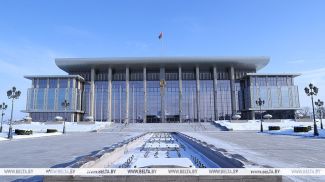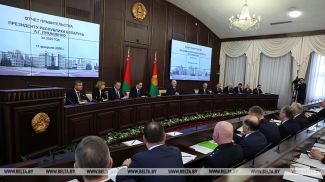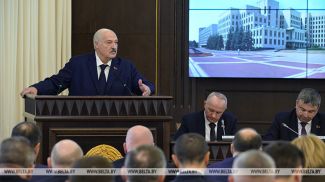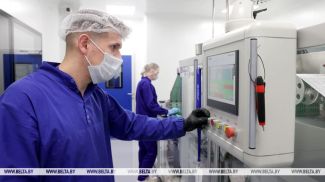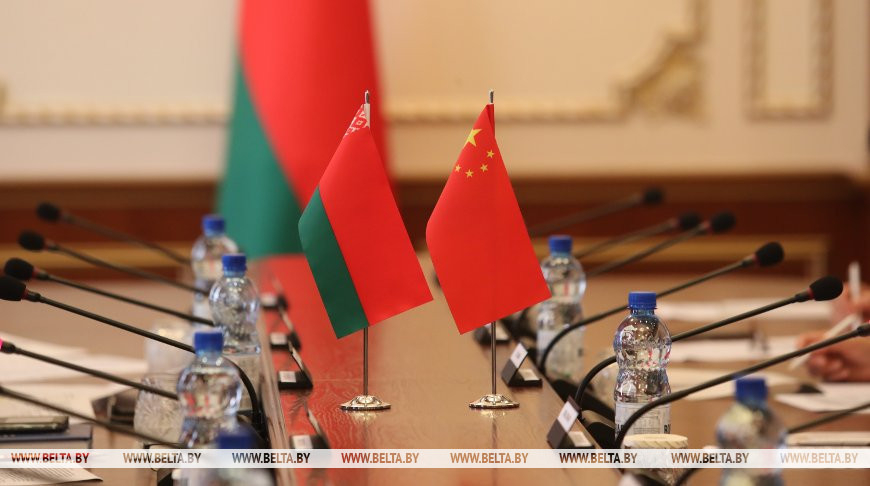
MINSK, 31 August (BelTA) – Belarus President Aleksandr Lukashenko has granted a paper and pencil interview to the Chinese news agency Xinhua. The interview was timed to the head of state’s working visit to China where he is expected to participate in a Shanghai Cooperation Organization summit in Tianjin and in the celebrations of the 80th anniversary of the Victory in the Chinese nation’s War of Resistance Against Japanese Aggression and in the World Anti-Fascist War, BelTA has learned.
The president had to answer questions about the up-to-date bilateral agenda, Belarus-China cooperation, global aspects of the world development, Belarus’ and China’s role and place in these processes. Aleksandr Lukashenko explained his point of view on these topics in detail.
On Belarus-China relations that have reached at an all-time high – the level of all-weather all-round strategic partnership, on the role of top-level diplomacy in promoting cooperation, and on the person of President of the People’s Republic of China Xi Jinping.
President Xi Jinping is not simply the leader of a huge country, of great China. The scale of an individual manifests itself over time and Xi Jinping’s scale is global. In today’s completely unpredictable circumstances he boldly assumes leadership and suggests a clear and concrete way of development not only to China but to the entire world. He has something many politicians in the West should learn: responsibility before his nation, strategic thinking, and iron will. This is why support for his policy in your country and outside it is colossal.
He and I have known each other for a long time. Xi Jinping is a strategic thinker and looks for decades ahead. But despite all his fundamentality he is a very contemporary leader. His business acumen, performance capacity, attention to the smallest details, the ability to instantly make decisions, and adopt the very best and new things make your leader understandable and close to partners across the entire world.
It is also very important that he leads China along the path of evolutionary development. Without revolutions, without shocks, without destroying what the previous generations have painstakingly created. Everything is getting done incrementally and only in the interests of the people. This is why the Chinese model is so stable and offers an attractive example for many countries. Unlike those, who try to “plant democracy” with bombs and sanctions, China demonstrates that one can develop peacefully and calmly with respect for other states.
As for diplomacy, in my opinion, leaders of countries always have a special role to play and a special responsibility to bear. One can sign hundreds of papers but if there is no trust, no persistence in the realization of the decisions you make, the efforts will be futile.
Belarus and China are connected by the highest degree of mutual trust and respect. I am grateful for the fact that for Belarus President Xi is not only a reliable partner but a sincere friend. Thanks to unconditional support on his part Belarusian-Chinese relations have reached an all-time high of all-weather all-round strategic partnership.
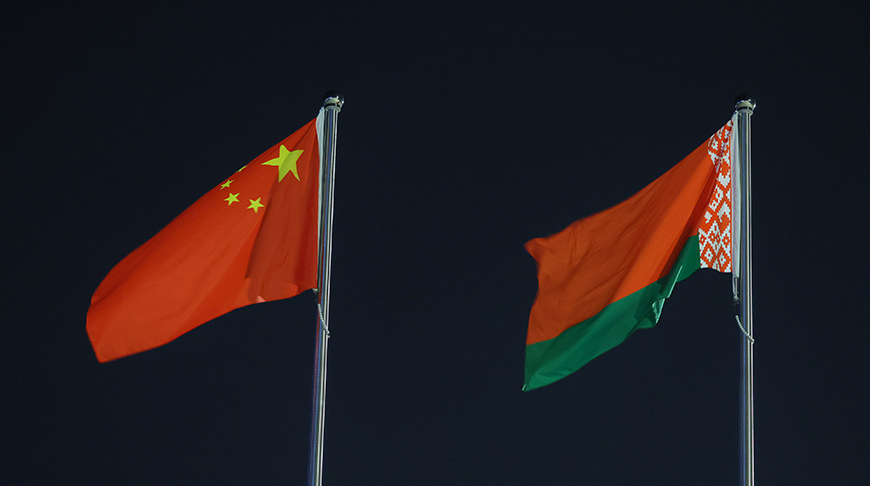
Our personal contacts enable a trustful dialogue that nothing else can substitute. In the modern world it is leaders that create the political foundation for interaction, that formulate common goals, determine priority avenues, and confirm readiness to deepen manufacturing cooperation.
I am absolutely convinced that Belarusian-Chinese cooperation will only grow stronger. Together we implement massive projects. We support each other in the international arena. It is the genuine diplomacy of the 21st century.
On the most impressive changes in China in the last few years and expectations from the current 16th visit to China.
It has been over 30 years since my first visit to the Celestial Empire. Back then I was a member of the parliament. Back then China was totally different but I realized right away that future belongs to this country.
All these years I’ve been watching the rapid and awe-inspiring changes in the People’s Republic of China with great interest.
Every time I come to China, I notice how rapidly it changes and I admire how carefully it preserves national traditions.
Certainly, I am impressed by your metropolises with high-speed transportation and cutting-edge digital infrastructure. China’s accomplishments are impressive in the areas where the country has already become a world leader: the production of industrial robots, the development of driverless vehicles and trucks, and the development of artificial intelligence. The space program, accomplishments in green energy and in the creation of a powerful modern industrial base are worth mentioning. I’d also like to note China’s attentive approach to ecology and innovative development. These are very important areas. And I also see perfectly well what efforts the country makes in social sphere, in education and healthcare in order to improve the quality of life. As a whole, China is the brightest example of how the dynamic development of the economy can be combined with care for the people.
Personally I attribute China’s success primarily to discipline and diligence of the Chinese nation. Your nation and ours are very similar in this regard. And also to the Confucian collective responsibility and strategically true leadership under the guidance of President Xi Jinping.
I have the most positive expectations regarding the current visit.
First of all, it has been exactly one year since Belarus joined the “Shanghai family”. At present not only China is summarizing results of its presidency over the organization but Belarus is evaluating the first year of its work as an SCO member state. We are also being evaluated by all the participating states, which believed in genuine intentions of the Republic of Belarus to work for the benefit of the organization, for the sake of safe and sustainable development of Eurasian space.
Secondly, this visit represents another opportunity for stepping up our strategic partnership. It will be a new impulse for Belarusian-Chinese cooperation in trade and economy, for invigorating joint projects in the field of science, technology, and manufacturing cooperation. We may be able to explore new cooperation avenues.
I also have no doubt that this visit will become another confirmation of the all-weather friendship and strategic partnership between Belarus and China.
On the current state of Chinese-Belarusian practical manufacturing cooperation and on plans to further facilitate high-quality mutually beneficial cooperation of the two countries.
Indeed, Belarus was one of the first few countries to join the Belt and Road initiative. We realized right away that these are not just pretty words, that these are concrete opportunities and prospects for the economy and for the people.
Over these years cooperation with China has produced tangible results. I would like to draw attention to the Great Stone Industrial Park, which your leader has described as a pearl of the Belt and Road initiative. It was extremely important for me to prevent the park from becoming a logistics hub and to make it a genuine cluster for science-intensive manufacturing facilities. Nowadays it is a work site where enterprises with modern technologies, digital solutions, and innovative approaches are being set up. Competences are born, new jobs are created, and the future of the economy is shaped here.
Our countries are also successfully implementing a program of joint technological projects aimed at modernizing the manufacturing sector and stepping up manufacturing cooperation in the spheres of innovations and digital economy.
Fruitful cooperation is developing in the field of sustainable development, including the realization of the UN Agenda 2030 for Sustainable Development. With support of the Chinese side we have launched the first project within the framework of the initiative for global development. The project is being implemented with assistance of the Foundation for South-South Global Development and Cooperation of the Chinese government. The protection of Belarus’ forests is a complex initiative meant to ensure preparedness for preventing and responding to fires at the local level.
Belarus is ready to continue tightly cooperating with the Chinese side in several key areas in the future.
First of all, in a bid to deepen the symbiosis of national development strategies, to step up interaction in the fields of digital economy, logistics, high technologies, and to look for new ways for expanding trade and economic integration.
Secondly, efforts will continue to perfect mechanisms of intergovernmental cooperation with a view to improving the efficiency of coordination and realization of large projects, ensuring their full compliance with common strategic interests of the parties.
Thirdly, innovations and cutting-edge technologies as the key driver of economic growth will be emphasized. We have already jointly conducted so-called Years of Cooperation in the fields of science, technology, and innovations. And we have made plans to pay more attention to manufacturing cooperation.
Fourthly, we will continue expanding humanitarian exchanges and cultural ones, bolstering mutual understanding and trust between our nations. Grassroots diplomacy is the most durable foundation for long-term development of bilateral relations.
On the role of the SCO in maintaining regional peace and stability, promoting common development and prosperity, as well as on the plans of Belarus, which has recently become a new member country of the SCO, for its activities within this organization.
The SCO is an organization focused on the future. Today, in the context of the transition to a just multipolar world order, the unity of views among the association's participants and their ability to make coordinated decisions are of particular value.
We saw this potential from the start and it paid off.
Over the past 20-plus years, the SCO has formed a unique model of regional security and development based on multilateral cooperation. The organization has proven that security issues can be resolved not through confrontation, but through joint measures, i.e. exchanging intelligence data, conducting exercises, and building trust between states. Thanks to this, it has been possible to prevent hundreds of terrorist attacks and create a system that stabilizes Eurasia.
Among the most notable achievements are the signing of several key conventions, the establishment of the Regional Anti-Terrorist Structure (RATS), the development of a database on threats, and the execution of hundreds of joint operations. Exercises are systematically organized, and work in the areas of border control and combating transnational crime is coordinated. After 2020, the SCO added new critical areas of cooperation: cybersecurity, biosecurity, and public health protection.
It can be said that the SCO is confidently becoming a diplomatic player on a global level. The organization offers a new approach to international relations, distinct from Western models of hegemony. The “Shanghai Spirit” ensures equal cooperation and the search for compromises. The SCO integrates the Belt and Road Initiative, shapes the principles of digital governance, and creates dialogue platforms for developing countries.
We have actively engaged in the work of the SCO's security mechanisms, including its counterterrorism bodies. I will note that we have invited SCO countries to join the work on the Eurasian Charter for Diversity and Multipolarity in the 21st Century.
Belarus, possessing a developed border control system and modern means of cyber protection, is ready to offer its partners an exchange of technology and joint exercises on protecting critical infrastructure from cyberattacks.
No less significant in the SCO's activities is the economic component. I would even say it should play a key role. To achieve this, we must create effective mechanisms for mutual settlements in national currencies and develop investment infrastructure and logistics.
Humanitarian and cultural cooperation is gaining increasing importance. Countries are interacting in education, justice, and social protection, thereby developing the “Shanghai Spirit” of mutual respect.
I would like to acknowledge the immense and critically important work of China in promoting the concept of a Community with a Shared Future for Mankind, which is interwoven with the Shanghai cooperation agenda.
With Belarus' accession to the SCO, the number of its member states has increased to ten, which, without false modesty, has of course strengthened the organization's influence in the Eurasian space.
Moreover, our country has become a connecting link in economic projects, as new routes to Europe open up through us. Belarus can offer SCO member states supplies of its products, from high-tech agricultural machinery to organic food products and potash fertilizers (here we hold one of the leading positions in the world). Belarusian expertise in machine building, food production, as well as established technologies for the deep processing of various raw materials can form the basis for new joint industrial clusters within the SCO.
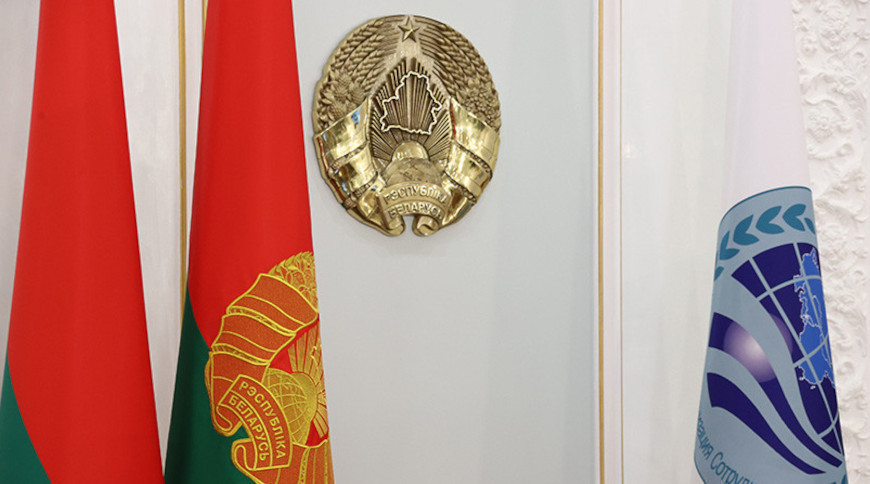
Belarus actively participates in people's diplomacy forums and supports various formats of cooperation between scientific organizations and cultural centers. The SCO University, youth camps and exchange programs, digital education, and projects in the fields of ecology and artificial intelligence - all of this is forming a robust network of humanitarian ties.
Belarusian universities are successfully implementing partnership projects with universities from countries of the “Shanghai family”, including in the fields of ICT, engineering, and biological sciences. For example, Belarusian State University (BSU) collaborates with Peking University on biological disciplines. Leading Belarusian universities (Belarusian State University of Informatics and Radioelectronics - BSUIR, Belarusian State Pedagogical University - BSPU, Belarusian State Technological University - BSTU, and others) are successfully enrolling students from China.
The network of Belarusian cultural and research centers in SCO member states is expanding rapidly. They not only promote the Belarusian language and culture but also encourage bilateral and multilateral academic research.
We attach great importance to the development of youth interaction. After all, young people are the main resource of the future, and it requires serious investment. Youth exchange programs remain a priority: participation in forums, competitions, international camps, and projects involving volunteering and technological partnership.
On the significance of the Chinese People's War of Resistance against Japanese Aggressors for the Victory in the World Anti-Fascist War, and on the need to jointly protect our shared historical memory in a situation where certain forces on the international stage are attempting to distort historical truth.
The Chinese People's Great War of Resistance was not only an integral part of national history but also a most important chapter of the global anti-fascist struggle. It was China that became the main battlefield in the East and paid an exorbitantly high price in that monstrous war.
China and Belarus both suffered enormous losses in the fight against fascism and militarism. Tens of millions of people perished; many cities and villages were wiped off the face of the earth. In our country, every third person was a victim of the war.
The occupiers tried to exterminate us root and branch in concentration camps and death factories, but were met by heroic resistance from ordinary people who did everything in their power to bring Victory closer. The population joined the partisans en masse and fought selflessly in the underground resistance. By the way, on the territory of our country, in the city of Vitebsk, an underground group of Chinese origin was active among others, and there were also Chinese nationals in the partisan detachments. And in China, Soviet military advisors and specialists, including Belarusians, fought shoulder to shoulder with their Chinese comrades.
As a historian, I understand particularly well how terrible that war was and what an invaluable contribution our peoples made to the common Victory. It is the greatest lesson in courage, resilience, and patriotism for many future generations of our citizens.
Initiatives such as the photo exhibition by the Xinhua news agency opened in Minsk to mark the 80th anniversary of the Victory, and the awarding of anniversary medals from the People's Republic of China to our veterans who participated in the battles for China's liberation, help preserve the memory of those events and educate the youth.
This is especially important today, in an extremely difficult international situation, when some are trying to distort and rewrite history. It is crucial to jointly protect the memory of our common Great Victory. We must speak loudly and clearly about the heroism of our peoples and the exceedingly high price of freedom.
Therefore, in the future, Belarus and China will undoubtedly continue to implement such joint projects and will comprehensively support educational and cultural initiatives to preserve the truth and memory of that war and our Victory. Otherwise, everything could repeat itself.
On the prospects for the development of the Global South, which is becoming an important force driving positive change against the backdrop of challenges such as geopolitical tension and rising protectionism.
Today, the countries of Asia, Africa, and Latin America are emerging from the shadow of their colonial past and are more decisively asserting themselves on the world stage. They no longer want to be merely suppliers of raw materials and cheap goods but aspire to play a significant role in the global economy. And rightly so. Their influence is growing visibly: the economic growth of many Global South countries is already outpacing that of the developed nations of the North, and trade and financial centers are gradually shifting to Asia.
These countries produce everything necessary, from raw materials to high technology, and are therefore capable of fully meeting the needs of their peoples. They are united in their pursuit of a fair and equitable world, one where the interests of every state are taken into account and decisions are made collectively. This is why we see a rise in their activity, a strengthening of existing regional organizations, and the formation of new associations and platforms - I will name just the SCO, BRICS, ASEAN, the African Union, and CELAC. These organizations allow for the coordination of positions on key issues on the path toward creating alternative institutions of global governance.
The countries of the Global South act independently based on their own interests. They refuse to automatically repeat the decisions of others, insist on the peaceful settlement of conflicts, equality and openness in the economy, and advocate for the participation of all countries in solving global problems, including climate issues. This force is already influencing the world order, and its role will only grow. This is a new center of power.
I am confident that the future of developed countries will largely depend on how quickly they can recognize this new reality, stop living by old dogmas, and learn to build equal, mutually respectful relations with the Global South.
Belarus, sharing the principles and views of the Global Majority, considers itself an integral part of it and is actively participating in the formation of a new world order. We joined the SCO and became a partner of BRICS with specific proposals that are already working and producing results. We did not come empty-handed, but with a clear agenda and promising projects in the areas of energy, transport, logistics, finance, industrial cooperation, food security, trade, and technology. In the future, we are counting on the continuation of fruitful cooperation with China as one of the undisputed leaders of the Global South and the entire world. For the sake of our countries, for the sake of our peoples.




